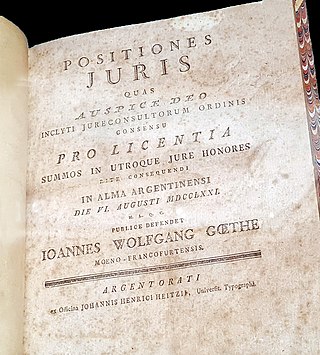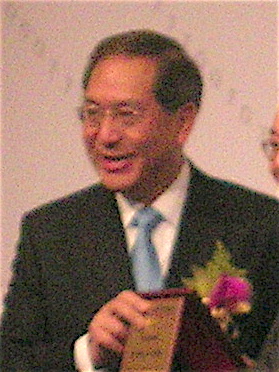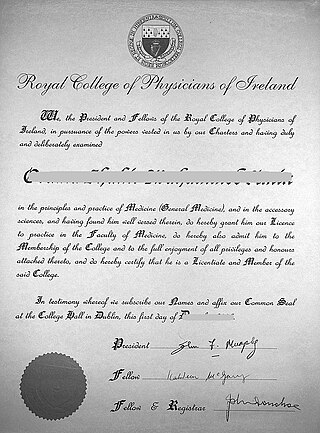Related Research Articles

A licentiate is an academic degree present in many countries, representing different educational levels. It may be similar to a master's degree when issued by pontifical universities and other universities in Europe, Latin America, and Syria.
The United States Medical Licensing Examination (USMLE) is a three-step examination program for medical licensure in the United States sponsored by the Federation of State Medical Boards (FSMB) and the National Board of Medical Examiners (NBME). Physicians with a Doctor of Medicine (MD) degree are required to pass the USMLE for medical licensure. However, those with a Doctor of Osteopathic Medicine degree (DO) are required to take the COMLEX-USA (COMLEX) exams but may also sit for the USMLE as well.
Membership of the Royal Colleges of Physicians of the United Kingdom (MRCP(UK)) is a postgraduate medical diploma in the United Kingdom (UK). The examinations are run by the Federation of the Medical Royal Colleges – the Royal College of Physicians of London, the Royal College of Physicians of Edinburgh, and the Royal College of Physicians and Surgeons of Glasgow. The three Royal Colleges of Physicians share this common three part assessment in general medicine which consists of two written parts and one clinical examination. Examinations are held throughout the UK and in overseas centres.
The Hong Kong Advanced Level Examination, or more commonly known as the A-level, conducted by the Hong Kong Examinations and Assessment Authority (HKEAA), was taken by senior students at the end of their matriculation in Hong Kong between 1979 and 2012. It was originally the entrance examination in University of Hong Kong until the introduction of the Joint University Programmes Admissions System (JUPAS) in 1992, which made it the major university entrance examination until academic year 2011/2012.
The Professional and Linguistic Assessments Board (PLAB) test provides the main route for International Medical Graduates (IMGs) to demonstrate that they have the necessary skills and knowledge to practise medicine in the United Kingdom (UK). PLAB is a two part assessment that overseas doctors, from outside the European Economic Area and Switzerland, usually need to pass before they can legally practise medicine in the UK. It is conducted by the General Medical Council of the United Kingdom. The test is designed to assess the depth of knowledge and level of medical and communication skills possessed by the international medical graduates. The PLAB blueprint sets out what candidates are expected to demonstrate in the test and beyond.

Arthur Li Kwok-cheung, GBM, GBS JP is a Hong Kong doctor and politician. He is currently member of the Executive Council of the Hong Kong Special Administrative Region and the chairman of the Council of the University of Hong Kong (HKU). He was Vice-Chancellor of the Chinese University of Hong Kong (CUHK) from 1996 to 2002 and Secretary for Education and Manpower from 2002 to 2007. Li’s dictatorial and ruthless leadership style led some to refer to him as "King Arthur" and even "the Tsar". He is the grandson of the co-founder of the Bank of East Asia, Li Koon-chun, and brother of its current chairman, David Li. He was awarded the Grand Bauhinia Medal (GBM) by the Hong Kong SAR Government in 2017.
The Postgraduate Certificate in Laws is an intensive one-year, full-time professional legal qualification programme in Hong Kong. It allows graduates to proceed to legal training in order to qualify to practice as either a barrister or a solicitor in Hong Kong. The "LL." of the abbreviation for the certificate is from the genitive plural legum. The programme is similar to the Legal Practice Course or the Bar Professional Training Course in England and Wales, or the Certificate in Legal Practice (Malaysia) in Malaysia which focuses heavily on practical and procedural issues in legal practice, unlike a first degree in law.
Higher education in Hong Kong means any education higher than secondary education, including professional, technical, and academic. It is the highest level of education in Hong Kong, regulated under the Hong Kong Law.
Modern medical education in Hong Kong started in 1887 with the founding of the Hong Kong College of Medicine for Chinese. Six institutes of higher education are currently engaged in the training of medical practitioners in Hong Kong.

Engineering education is the activity of teaching knowledge and principles to the professional practice of engineering. It includes an initial education, and any advanced education and specializations that follow. Engineering education is typically accompanied by additional postgraduate examinations and supervised training as the requirements for a professional engineering license. The length of education, and training to qualify as a basic professional engineer, is typically five years, with 15–20 years for an engineer who takes responsibility for major projects.
An international medical graduate (IMG), earlier known as a foreign medical graduate (FMG), is a physician who has graduated from a medical school outside of the country where he or she intends to practice. The term non-local medical graduate may be similarly used in countries with distinct licensing regions within them. Generally, the medical school of graduation is one listed in the World Directory of Medical Schools (WDOM) as accredited by the Foundation for Advancement of International Medical Education and Research or the World Health Organization.

The Hong Kong Diploma of Secondary Education Examination (HKDSE) is an examination organised by the Hong Kong Examinations and Assessment Authority (HKEAA). The HKDSE examination is Hong Kong's university entrance examination, administered at the completion of a three-year senior secondary education, allowing students to gain admissions to undergraduate courses at local universities through JUPAS. Since the implementation of the New Senior Secondary academic structure in 2012, HKDSE replaced the Hong Kong Certificate of Education Examination and Hong Kong Advanced Level Examination.

The Medical Council of Canada (MCC; French: Conseil médical du Canada, CMC) is an organization charged with the partial assessment and evaluation of medical graduates and physicians through standardized examination. It grants the qualification called Licentiate of the Medical Council of Canada (LMCC), which is a requirement to independently practice medicine in Canada. The MCC's role in physician assessment has been repeatedly criticized as obsolete for several decades.
Hong Kong's medical infrastructure consists of a mixed medical economy, with 12 private hospitals and 43 public hospitals. Hong Kong has high standards of medical practice. It has contributed to the development of liver transplantation, being the first in the world to carry out an adult to adult live donor liver transplant in 1993. Both public and private hospitals in Hong Kong have partnered with the Australian Council on Healthcare Standards (ACHS) for international healthcare accreditation. There are also polyclinics that offer primary care services, including dentistry.

The CUHK Faculty of Medicine is the medical school of The Chinese University of Hong Kong. Established in 1981 as Hong Kong's second medical school, the faculty consists of five schools offering undergraduate and postgraduate programmes, including in the fields of medicine, nursing, pharmacy, and traditional Chinese medicine. The Prince of Wales Hospital is the faculty's teaching facility and base of research.

The Li Ka Shing Faculty of Medicine or LKS Faculty of Medicine (HKUMed), formerly known as the Faculty of Medicine of the University of Hong Kong, is a medical school consisting of several schools and departments that provide tertiary programmes in medicine, nursing, pharmacy and Chinese medicine. English is the medium of instruction for all classes, while Chinese is retained for the teaching of Chinese medicine. It is located several kilometres away from the university's main campus and is near the Queen Mary Hospital, which is its main teaching facility and research base. Founded in 1887, it is also one of the oldest western medical schools in the Far East.
Licentiate of the Medical Council of Hong Kong (LMCHK) is a medical license issued by the Medical Council of Hong Kong to doctors that have graduated from medical schools outside of Hong Kong and have met the requirements for such licensure in Hong Kong. The Medical Council of Hong Kong requires that these non-locally graduated doctors display the LMCHK qualification as a post-nominal title first, before listing any other quotable qualifications, such as MD or MBBS. The LMCHK are represented by the Licentiate Society, an independent, non-profit organization.

The Medical Licentiate Society of Hong Kong is an independent, non-profit, recognized professional body representing doctors that have graduated from medical schools outside of Hong Kong and that have attained medical licensure in Hong Kong. The group was founded in 2017 and incorporated in 2019. It has offices in Wan Chai, Hong Kong. It is the only incorporated organization dedicated to such doctors.

The Association of Licentiates of Medical Council of Hong Kong (ALMCHK) is an independent, non-profit, professional medical organisation established in 1995 representing the licentiate doctors in Hong Kong. It is the first of its kind designated for all non-local graduated licentiate doctors in Hong Kong. Membership are designated to registered doctors in Hong Kong who obtained LMCHK. The primary objective is to safeguard the welfare and rights of licentiates doctors. It is also one the few CME programme providers accredited by the Medical Council of Hong Kong (MCHK).

Membership of the Royal College of Physicians of Ireland (MRCPI) is a postgraduate medical qualification in the field of general internal medicine awarded by the Royal College of Physicians of Ireland (RCPI) through examination. The MRCPI in general internal medicine is accredited by the Irish Medical Council as the foremost knowledge-based assessment for internal medicine in Ireland. In addition, many countries worldwide recognize the qualification as a postgraduate degree in internal medicine and designate its holder as a specialist physician. The 3 parts of the MRCPI examinations are held throughout the Republic of Ireland and its overseas centers. The MRCPI in general internal medicine is the flagship qualification and examination of the RCPI and should be differentiated from its other postgraduate qualifications awarded through examinations in other specialities.
References
- ↑ "HKMLE". scmp.com. South China Morning Post. 21 April 2014. Retrieved 23 November 2019.
- ↑ "Council to set Licensing Examination". Hong Kong e-Legislation, the official database of Hong Kong legislation. The Government of the Hong Kong SAR. Retrieved 23 November 2019.
- ↑ "Hong Kong e-Legislation". www.elegislation.gov.hk. Archived from the original on 2017-03-14. Retrieved 2019-11-24.
- ↑ "Before Licensing Examination, Application". Licensing Examination Information Portal. Medical Council of Hong Kong. Retrieved 23 November 2019.
- ↑ "Statistics – Licentiate Examination".
- ↑ "SCMP article - "Hong Kong medical body's licensing exam for overseas doctors slammed as 'too broad'"". 9 November 2015.
- ↑ "Licentiate Examination Information Portal - Press Release".
- ↑ "Licentiate Society supports candidates in preparing for the HKMLE".